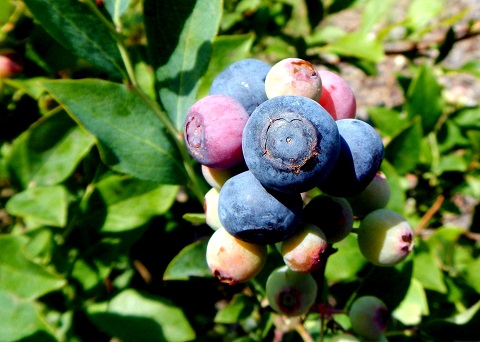Blueberry season is quickly coming to an end in Central Alabama. We usually have blueberries through July, but with our mild winter and early spring temperatures the blueberries are about fizzled out. With that said, it is now time to start thinking about next year. A little maintenance now will ensure a healthy blueberry crop next year.
The most important thing you can do any time of year for a blueberry is water and weed control. Now that the plants are finished making berries the plants will begin to put their energy into making new shoots and branches. This is exactly what you want as the new growth between now and Fall is where the biggest and best berries will be next year. For optimal branch growth the plants will need water, mulch and a little boost of fertilizer. Make sure not to fertilize after mid September or the new tissue will be susceptible to frost damage.
Generally, blueberries need fertilizing twice a year, once in early spring and again as the berries fade away. Use a Urea based fertilizer or a fertilizer labeled for Azaleas/Camellias as this will help acidify the soil as blueberries like a low pH of 4.5-5.2. Have a soil test done if you have not had one in the past three years to know what nutrients are lacking and what the pH is.
Pruning blueberries now will multiply your berry production next year. As your plants start to grow long straight shoots/canes, clip these a little lower than where you would like to have the fruit next year. This means, if you want the fruit to be chest height, clip those canes about a foot lower. The more you clip (especially the long canes) the more branching you will get. The more branches you get, the more fruit you will have from those branches next year. Also remove any dead or diseases branches while you prune.
Plant more blueberries this fall and remember to plant different varieties of “Rabbiteye” to prolong your season as different varieties produce at different times throughout the summer. Plant blueberries in full sun with a moist, well-aerated, well-drained soil, high in organic matter. Incorporate organic matter such as peat moss, compost, or fine pine bark into the soil and mulch around the plant to help in retaining water and suppressing weeds.
If you have more questions about growing and maintaining blueberries or other gardening related questions, call the Master Gardener Helpline. March through August the Alabama Cooperative Extension System offers a Gardening Helpline for the general public each Monday through Thursday from 9:00 a.m. until 1:00 p.m. This helpline is operated by Master Gardener Volunteers who use research based information to best answer all of your gardening questions.
By Mallory Kelley
Regional Extension Agent
Home Grounds, Gardens, Home Pests
 Part of the Alabama Cooperative Extension Service (ACES)
Part of the Alabama Cooperative Extension Service (ACES)
